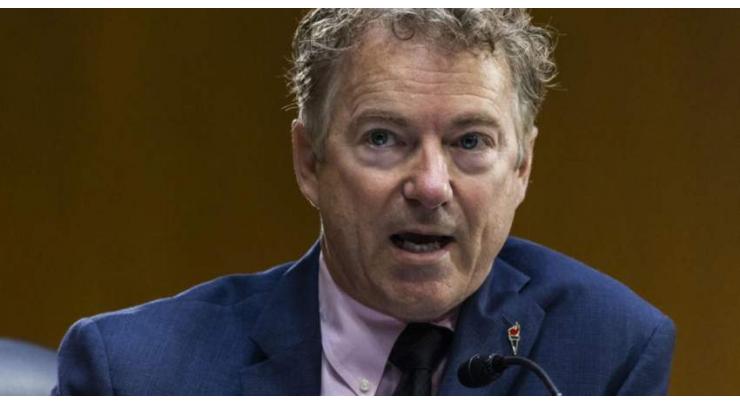
Ukraine Aid Bill Likely To Pass After DoD's Minor Concessions To Senator Paul
Fahad Shabbir (@FahadShabbir) Published May 16, 2022 | 08:00 PM

The US bill that would allow further military assistance to Ukraine is likely to sail through the Senate after the US Department of Defense (DoD) makes symbolic concessions to placate maverick Senator Rand Paul, experts told Sputnik
MOSCOW (UrduPoint News / Sputnik - 16th May, 2022) The US bill that would allow further military assistance to Ukraine is likely to sail through the Senate after the US Department of Defense (DoD) makes symbolic concessions to placate maverick Senator Rand Paul, experts told Sputnik.
Last Thursday, Paul delayed a Senate attempt to fast track the $40 billion Ukraine aid bill, citing concerns over government spending, debt and inflation. Paul has demanded an amendment to the legislation that would provide for further Federal oversight of the money and weapons being sent to Ukraine.
If the bill passes, the funds mentioned will come on top of more than $4.5 billion in military aid the Biden administration has already committed to Ukraine, about $3.8 billion of which came after Russia launched its military operation in late February.
Roderick Kiewiet, a professor of political science at the California Institute of Technology, thinks that Senator Paul makes a valid point since when a country sends military or financial aid abroad some part of it could be used for purposes that were not originally intended. At the same time, he noted that this is unlikely to be a major issue in this case as all weapons sent to Ukraine will be used against Russian troops.
"What I believe will happen is that the Pentagon will promise enhanced oversight, which is actually a largely symbolic gesture. But once they do, Paul will vote for the bill," Kiewiet said.
This stance is echoed by Nikolai Sokov, a senior fellow at the Vienna Center for Disarmament and Nonproliferation, who said that Paul was pursuing "a traditional Republican agenda" and that a compromise is likely to be achieved, even though it will delay the assistance.
The expert did not rule out the possibility of some of the weapons ending up on the black market, especially after the conflict is over.
"This has been a standard development and it's hard to expect anything else. After all, the government cannot fully control arms in the middle of a war, not everything is under control of the official military, and accounting is impossible," Sokov explained.
Meanwhile, Michael Desch, a professor of International Relations at the University of Notre Dame and the director of the Notre Dame International Security Center, opined that the bill will likely intensify the hostilities in Ukraine as well as hinder a diplomatic solution to the conflict. He also expressed concerns that widespread provision of small arms in Ukraine could benefit the country's criminals and extremists.
"Heavier weapons are likely to be less of a problem in this regard as there are fewer of them and they require maintenance beyond what nonstate actor can sustain," Desch added.
When asked about other forms of military assistance, apart from weapon supply, the experts listed training, development, economic aid, as well as analytical work.
"Also worth recalling that most of arms are being supplied from existing stocks and in real life the bulk of assistance will go toward replenishing these stocks. By some estimates NATO countries, including the US, will need 2-4 years to replenish their stocks of arms; I even heard estimates that armies of some countries will not be able to fight at this moment," Sokov stated.
Related Topics
Recent Stories

Experts raise concerns over introduction of 10-stick packs

Iranian president arrives in Karachi

Law Minister expresses Govt's resolve to address issue of missing persons

Rizwan’s batting order may be changed: Sources

Nawaz Sharif to visit Guangzhou exhibition in China

FM Dar not traveling to China: Foreign Office

PM takes notice of deliberate delay in tax cases

Iranian President visits Allama Iqbal’s mausoleum

Iranian President arrives in Lahore today

Currency Rate In Pakistan - Dollar, Euro, Pound, Riyal Rates On 23 April 2024

Today Gold Rate in Pakistan 23 April 2024

Islam enlightened world with its teachings about knowledge: Dr Jamileh
More Stories From World
-
Russia rejects US journalist Gershkovich's detention appeal
3 minutes ago -
Prosecutors accuse Trump of 'willful' violations of gag order
43 minutes ago -
French artist JR downsizes at Venice Biennale with Orient Express
2 hours ago -
Umrah & Ziarah Forum 2024: A gateway to enhance pilgrimage services in Holy land
2 hours ago -
16 dead, 28 missing in migrant boat capsize off Djibouti: UN
2 hours ago -
16 dead, 28 missing in migrant boat capsize off Djibouti: UN
3 hours ago
-
How UK's biggest water supplier sank into crisis
3 hours ago -
EU lawmakers greenlight new rules to rein in national spending
3 hours ago -
Hamas to stay in Doha if 'useful' for Gaza war mediation: Qatar
4 hours ago -
London stock market strikes record as sentiment lifts globally
4 hours ago -
In Brazil, hopes to use AI to save wildlife from roadkill fate
5 hours ago -
Taiwan hit by dozens of strong aftershocks from deadly quake
5 hours ago